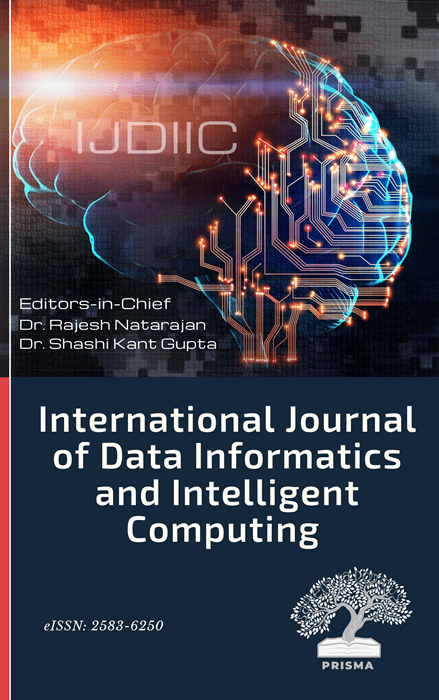Optimizing Crop Yield Prediction through Multiple Models: An Ensemble Stacking Approach
DOI:
https://doi.org/10.59461/ijdiic.v3i2.120Keywords:
AdaBoost Regressor, Decision Tree, Ensemble Learning, Linear Regressor, Stacking RegressorAbstract
Agriculture plays a pivotal role in enhancing India's economy, providing employment opportunities, supporting various industries, and contributing significantly to livelihoods and rural development. Accurate crop yield prediction is essential for effective crop management, productivity enhancement, and ensuring a balance between supply and demand. Leveraging machine-learning techniques, particularly stacking regressors, can offer improved predictive accuracy by capturing complex relationships between agricultural variables. This research paper conducts a comparative analysis of various machine learning techniques and introduces stacking ensemble learning for predicting crop yields in Indian agriculture. Each ML model, including Decision Tree, AdaBoost Regressor, and Linear Regressor, underwent individual training, testing, and prediction with hyperparameter tuning. Furthermore, the study implemented stacking ensemble learning using Linear Regressor, Decision Tree, and AdaBoost Regressor as base learners, with Linear Regressor serving as the meta-learner. The experimental results demonstrated that the stacking ensemble learning model outperformed all individual ML models, showcasing an impressive R2 value of 98.92%. These findings underscore the efficacy of stacking regressors in enhancing predictive accuracy for crop yield prediction, offering valuable insights for agricultural decision-making and resource allocation in the Indian agricultural sector.
Downloads
References
B. M. Sagar and N. K. Cauvery, “Agriculture data analytics in crop yield estmation: A critical review,” Indonesian Journal of Electrical Engineering and Computer Science, vol. 12, no. 3, pp. 1087–1093, Dec. 2018, doi: 10.11591/ijeecs.v12.i3.pp1087-1093.
K. G. Liakos, P. Busato, D. Moshou, S. Pearson, and D. Bochtis, “Machine learning in agriculture: A review,” Sensors (Switzerland), vol. 18, no. 8. MDPI AG, Aug. 14, 2018. doi: 10.3390/s18082674.
D. Paudel et al., “Machine learning for regional crop yield forecasting in Europe,” Field Crops Res, vol. 276, Feb. 2022, doi: 10.1016/j.fcr.2021.108377.
D. Elavarasan and P. M. Durairaj Vincent, “Crop Yield Prediction Using Deep Reinforcement Learning Model for Sustainable Agrarian Applications,” IEEE Access, vol. 8, pp. 86886–86901, 2020, doi: 10.1109/ACCESS.2020.2992480.
T. van Klompenburg, A. Kassahun, and C. Catal, “Crop yield prediction using machine learning: A systematic literature review,” Computers and Electronics in Agriculture, vol. 177. Elsevier B.V., Oct. 01, 2020. doi: 10.1016/j.compag.2020.105709.
G. Lischeid, H. Webber, M. Sommer, C. Nendel, and F. Ewert, “Machine learning in crop yield modelling: A powerful tool, but no surrogate for science,” Agric For Meteorol, vol. 312, Jan. 2022, doi: 10.1016/j.agrformet.2021.108698.
V. Pandith, H. Kour, S. Singh, J. Manhas, and V. Sharma, “Performance Evaluation of Machine Learning Techniques for Mustard Crop Yield Prediction from Soil Analysis,” Journal of scientific research, vol. 64, no. 02, pp. 394–398, 2020, doi: 10.37398/jsr.2020.640254.
D. A. Bondre and M. Santosh Mahagaonkar, “PREDICTION OF CROP YIELD AND FERTILIZER RECOMMENDATION USING MACHINE LEARNING ALGORITHMS,” 2019. [Online]. Available: http://www.ijeast.com
M. Rashid, B. S. Bari, Y. Yusup, M. A. Kamaruddin, and N. Khan, “A Comprehensive Review of Crop Yield Prediction Using Machine Learning Approaches with Special Emphasis on Palm Oil Yield Prediction,” IEEE Access, vol. 9. Institute of Electrical and Electronics Engineers Inc., pp. 63406–63439, 2021. doi: 10.1109/ACCESS.2021.3075159.
L. S. Cedric et al., “Crops yield prediction based on machine learning models: Case of West African countries,” Smart Agricultural Technology, vol. 2. Elsevier B.V., Dec. 01, 2022. doi: 10.1016/j.atech.2022.100049.
S. Nosratabadi, K. Szell, S. Ardabili, B. Beszedes, and A. Mosavi, “Hybrid Machine Learning Models for Crop Yield Prediction.”
D. Paudel et al., “Machine learning for large-scale crop yield forecasting,” Agric Syst, vol. 187, Feb. 2021, doi: 10.1016/j.agsy.2020.103016.
L. S. Cedric et al., “Crops yield prediction based on machine learning models: Case of West African countries,” Smart Agricultural Technology, vol. 2. Elsevier B.V., Dec. 01, 2022. doi: 10.1016/j.atech.2022.100049.
F. Abbas, H. Afzaal, A. A. Farooque, and S. Tang, “Crop yield prediction through proximal sensing and machine learning algorithms,” Agronomy, vol. 10, no. 7, Jul. 2020, doi: 10.3390/AGRONOMY10071046.
M. Xu, P. Watanachaturaporn, P. K. Varshney, and M. K. Arora, “Decision tree regression for soft classification of remote sensing data,” Remote Sens Environ, vol. 97, no. 3, pp. 322–336, Aug. 2005, doi: 10.1016/j.rse.2005.05.008.
G. Shanmugasundar, M. Vanitha, R. Čep, V. Kumar, K. Kalita, and M. Ramachandran, “A comparative study of linear, random forest and adaboost regressions for modeling non-traditional machining,” Processes, vol. 9, no. 11, Nov. 2021, doi: 10.3390/pr9112015.
F. Divina, A. Gilson, F. Goméz-Vela, M. G. Torres, and J. F. Torres, “Stacking ensemble learning for short-term electricity consumption forecasting,” Energies (Basel), vol. 11, no. 4, Apr. 2018, doi: 10.3390/en11040949.
Downloads
Published
How to Cite
Issue
Section
License
Copyright (c) 2024 Renju K, Brunda V

This work is licensed under a Creative Commons Attribution-ShareAlike 4.0 International License.








